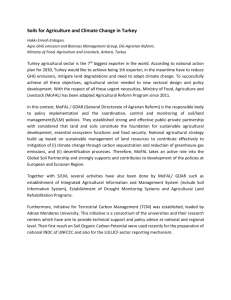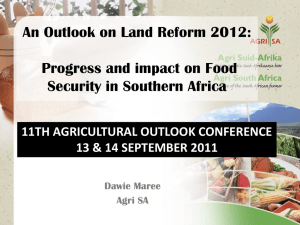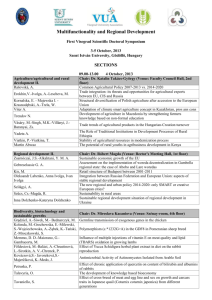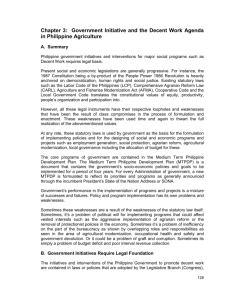TERMS OF REFERENCE THE RESUSCITATION OF STRUGGLING
advertisement
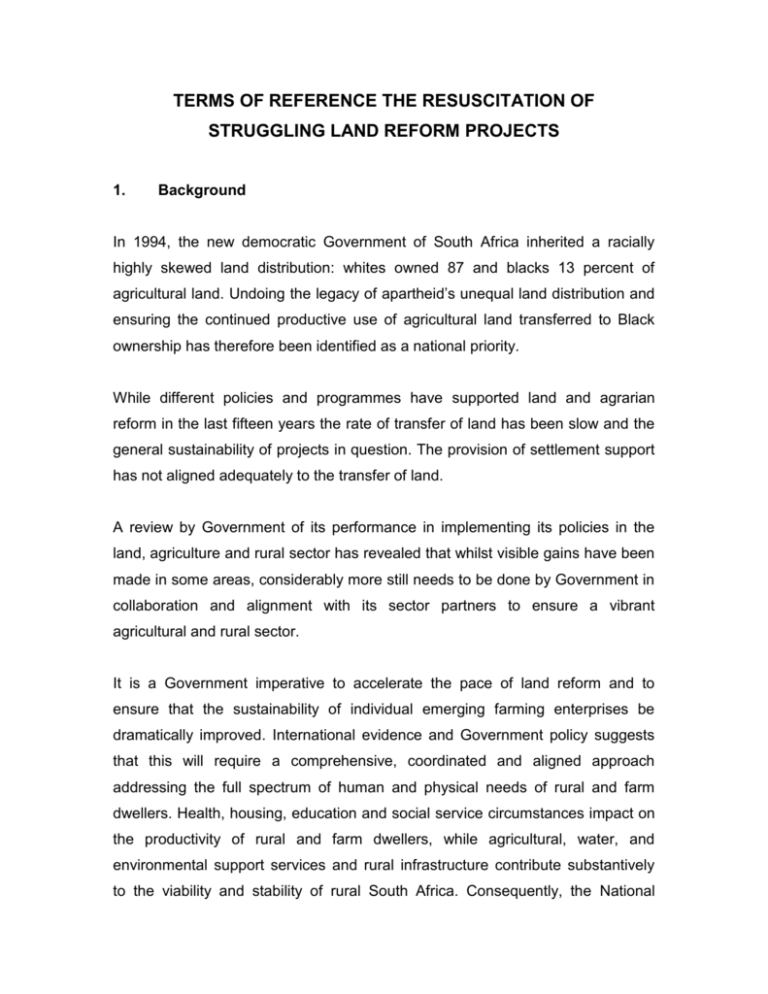
TERMS OF REFERENCE THE RESUSCITATION OF STRUGGLING LAND REFORM PROJECTS 1. Background In 1994, the new democratic Government of South Africa inherited a racially highly skewed land distribution: whites owned 87 and blacks 13 percent of agricultural land. Undoing the legacy of apartheid’s unequal land distribution and ensuring the continued productive use of agricultural land transferred to Black ownership has therefore been identified as a national priority. While different policies and programmes have supported land and agrarian reform in the last fifteen years the rate of transfer of land has been slow and the general sustainability of projects in question. The provision of settlement support has not aligned adequately to the transfer of land. A review by Government of its performance in implementing its policies in the land, agriculture and rural sector has revealed that whilst visible gains have been made in some areas, considerably more still needs to be done by Government in collaboration and alignment with its sector partners to ensure a vibrant agricultural and rural sector. It is a Government imperative to accelerate the pace of land reform and to ensure that the sustainability of individual emerging farming enterprises be dramatically improved. International evidence and Government policy suggests that this will require a comprehensive, coordinated and aligned approach addressing the full spectrum of human and physical needs of rural and farm dwellers. Health, housing, education and social service circumstances impact on the productivity of rural and farm dwellers, while agricultural, water, and environmental support services and rural infrastructure contribute substantively to the viability and stability of rural South Africa. Consequently, the National Departments of Agriculture and of Land Affairs have engaged in the last two years in a process of alignment, also with Provincial Departments, State owned Agricultural enterprises and other stakeholders, which has culminated in the development of the concept of creating a coherent land and agrarian delivery system. The Land and Agrarian Reform Programme (LARP), which is the product of this functional alignment and synchronization in government on land reform and agricultural support coupled with partnership approach towards service delivery, creates a delivery paradigm for agricultural and other support services based upon the concept of “One-Stop Shop” service centers located close to land reform beneficiaries. 2. Problem statement Struggling land reform projects have become an increasingly common and depressing feature. Giving agricultural land to people without the necessary farming, farm management and financial administration skills, without adequate finance for improvements and production costs, markets, networks, relationships and water rights, or a bankable business model that takes producer prices and market trends into account, is tantamount to setting them up for failure. Despite the fact that the government has devoted considerable energy and expenditure to each process of land and agrarian reform, a broad spectrum of stakeholders agree that some land reform projects are experiencing several challenges, which have led to some farms being abandoned or operating suboptimally. Government acknowledges that there are challenges surrounding the successful implementation of land reform and has committed to integrated support from all role players. 3. Aim of the Terms of Reference To provide guidance for sourcing of service providers/partners to develop proposals and implement plans to resuscitate struggling land reform projects. 4. Key Duties and Responsibilities Conduct an audit or scoping of prioritized farms/projects; Suggest a working model and incorporate into the business plan; Review, update and refine existing business plans of the farms/projects; Facilitate various working sessions to obtain inputs from stakeholders (relevant municipalities, Provincial Departments of Agriculture, Commodity Organizations, national Departments concerned, Agri-businesses etc.); Work with all stakeholders in resuscitating struggling land reform projects; Assist in attracting partners willing to invest in these projects; and Implementation of the integrated business plan. 5. Requirements Generally, all service providers/partners should: be AgriBEE compliant; Coordinate and provide agricultural settlement support strengthening the managerial and technical skills of beneficiaries; Ensure that private sector resources, capital and capacity is available and that risk sharing takes place; and Ensure sustainability through promotion of black economic empowerment, beneficiary participation, training/empowerment/mentorship. 5.1 For Commodity organizations These organizations must be able to deliver the following services: Proof of accredited access to various markets (compliance); Experience in conducting mentorship to beneficiaries; Experience in training and developing of farmers; Assist beneficiaries with infrastructure development for the commodity; Ability to provide financially empower small scale farmers; Ability to provide training and development of farmers in farming with commodity; Ability to provide training and development of farmers in management of the farm; Quality and standard setting for products; Capacity building skills and experience; Infrastructure development; and Training and development skills. 5.2 For Financial Institutions and Agri-businesses Financial capital plays a major role in commercial agriculture, rural communities and agricultural businesses. The unique chapter of farming makes agricultural financing complex and people in the sector find it difficult to obtain credit and/or retain creditworthiness. Financial success in agriculture requires reliable access to credit, sound financial management and advice that is specific to the agricultural industry. Both retail and development financial institutions will be considered based on the following: Experience on providing technical assistance, financial management, and bookkeeping; Provide planning services- valuation of land; compile business plans and legal entities; Caretakership and assets management; Experience in providing mentorship and capacity building of emerging farmers; Investment and Risk sharing; Packaging of AgriBEE projects; Crop/livestock/agricultural insurance; and BEE principles (by creating economically sustainable black business sector). 5.3 For Non-Governmental Organizations Non-Governmental Organizations should have the following capabilities: Facilitating and resolving land rights issues-tenure rights; Training and developing farmers (provide training on alternative farming methods, e.g. organic farming, human resources, financial management, pest control, farming enterprises and water management); Providing post-settlement support to beneficiaries; Project co-ordination, planning and management; Mechanisms of addressing land reform; Overall knowledge and understanding of land reform; Beneficiary selection; Monitoring and evaluation; and Advocacy; 5.4 Organised agriculture These organizations include farmer organizations which should also be involved in accelerating land and agrarian reform in the below stated ways: Assisting with land identification; Making inputs for the Area-based plans; Submission/inputs in terms of relevant land/agricultural policy and legislative development; Post-settlement support to land reform beneficiaries; Promotion of sustainable agricultural businesses; Identification of opportunities/alliances for land reform beneficiaries and/or new black farmers and other BEE initiatives; Experience in providing mentoring to beneficiaries; and Improvement of access to land, finance, resources for new and established entrants to farming.



